BMP-3
| BMP-3 | |
|---|---|
|
Current production BMP-3 | |
| Type | Infantry fighting vehicle |
| Place of origin |
Soviet Union Russia |
| Service history | |
| In service | 1987–present |
| Used by | See Operators |
| Wars |
First Chechen War Second Chechen War Yemeni Civil War (2015-present) Saudi-led intervention in Yemen (2015-present) |
| Production history | |
| Manufacturer | Kurganmashzavod |
| No. built | 2,000+ |
| Specifications | |
| Weight | 18.7 tonnes (18.4 long tons; 20.6 short tons) |
| Length | 7.14 m (23 ft 5 in) |
| Width | 3.2 m (10 ft 6 in) |
| Height | 2.4 m (7 ft 10 in) |
| Crew |
3 (commander, gunner, driver) 7 troopers (+ 2 additional seats) |
|
| |
| Armor | Aluminium alloy + steel, 35mm+ frontally, all around small arms fire protection up to 12.7mm |
Main armament | Bakhcha-U turret with 100 mm gun/launcher 2A70 (able to fire shells or the 9M117 Bastion ATGM), 30 mm autocannon 2A72 and 7.62mm PKT machine gun or Berezhok turret with 2A42, AGS-30 grenade launcher, Kornet-EM, and PKT machine gun[1] or AU-220M with BM-57 |
Secondary armament | 2×7.62 mm PKT machine guns |
| Engine |
UTD-29M diesel 500 hp (375 kW) |
| Power/weight | 27 hp/tonne |
| Suspension | torsion bar |
Operational range | 600 km (370 mi) |
| Speed |
72 km/h (45 mph) (road) 45 km/h (28 mph) (off-road) 10 km/h (6.2 mph) (water) |
The BMP-3 is a Soviet infantry fighting vehicle, successor to the BMP-1 and BMP-2. The abbreviation BMP stands for Boevaya Mashina Pehoty (Боевая Машина Пехоты, literally "Infantry Combat Vehicle").[2][3][4]
Production history
The design of the BMP-3 or Obyekt 688M can be traced back to the Obyekt 685 light tank prototype with 100 mm gun 2A48-1 from 1975.[5] This vehicle did not enter series production, but the chassis, with a new engine, was used for the next-generation infantry combat vehicle Obyekt 688[6] from A. Blagonravov's design bureau. The Ob. 688 weapons configuration—an externally mounted 30 mm gun and twin Konkurs ATGM launcher—was rejected; instead the new 2K23 armament system was selected. The resulting BMP-3 was developed in the early 1980s and entered service with the Soviet Army officially in 1987. It was shown for the first time in public during the 1990 Victory Day parade and was given the NATO code IFV M1990/1.
The BMP-3 is designed and produced by the Kurganmashzavod ("Kurgan Machine Building Plant") some variants however are built by the Rubtsovsk Machine Building Plant (RMZ), for example the BRM-3K.[7]
In May 2015, the Russian Defense Ministry signed a three-year contract to receive "hundreds" of BMP-3 vehicles to maintain its armored vehicle force until its replacement, the Kurganets-25, completes research and development. In the process of the BMP-s serial production, the vehicle's design underwent 1,500 amendments.[8]
In the Army-2017 show, the Russian Defence Ministry signed a contract covering the first deliveries of an unspecified number of BMP-3 infantry fighting vehicles (IFVs) fitted with the Epocha turret.[9]
Operational history
First Chechen War
The BMP-3 saw action with the Russian forces during the First Chechen War.
Saudi Arabian-led intervention in Yemen
The BMP-3 also saw military use with Emirati forces during the Saudi Arabian-led intervention in Yemen, where it is currently deployed.[10]
Design
Weaponry and optics
The BMP-3 is one of the most heavily armed infantry combat vehicles in service, fitted with a low-velocity 2A70 100 mm rifled gun, which can fire conventional shells or 9M117 ATGMs (AT-10 Stabber). 40 100mm-rounds and 8 ATGMs are carried. A 2A72 30 mm dual feed autocannon with 500 (300 HEI and 200 APT) rounds and a rate of fire of 350 to 400 RPM, and a 7.62mm PKT machine gun with 2,000 rounds, all mounted coaxially in the turret. The main gun elevates from −5° to +60°.[11] There are also two 7.62mm PKT bow machine guns, again with 2,000 rounds each. The BMP-3 is capable of engaging targets out to 5,000–6,000 meters with its ATGM weapon system 9K116-3 "Basnya". With conventional ammunition, such as the HE-Frag shell 3OF32, the 2A70 gun has a range of 4,000 meters.
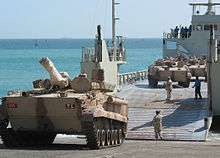
According to the manufacturer's web-site, all weapons can be fired from the halt, on the move, and afloat with the same effectiveness. The ability to hit targets on the move with missiles was successfully demonstrated during competitive evaluations in the UAE in 1991.[12]
The turret is fitted with the 2K23 system, which consists of an automatic loader with 22 rounds (the remaining 18 rounds are stored in the hull), a 1V539 ballistic computer, a cross-wind sensor, a 2E52-2 stabilising system, a 1D16-3 laser range finder, a 1K13-2 gunner's sight/guidance device, a PPB-1 gunner's sight and an OU-5-1 IR searchlight. The commander has a combined optical sight 1PZ-10, a day/night vision device TKN-3MB and an IR searchlight OU-3GA2.[5] Since 2005, the BMP-3 can be fitted with a new fire control system from the "Peleng" Joint Stock Company from Belarus. This consists of a SOZH-M gunner's main sight with an integrated laser range-finder and missile-guidance channel, a Vesna-K targeting system with thermal imaging camera and automatic target tracker AST-B, an armament stabilisation system, a ballistic computer with data input sensors and a PL-1 IR laser projector.[13][14][15] Since 2017, the BMP-3 is fitted with a new fire control system from the "Vologda Optical-Mechanical Plant" from Russia. This consists of a Sodema two-plane stabilized gunner's main sight with an integrated laser range-finder and missile-guidance channel plus a SOZH-M thermal imaging camera.[16]
Standard equipment includes five firing ports with associated vision blocks, an R-173 tranceiver, an R-173P receiver, a GO-27 radiation and chemical agent detector, an FVU filtration system, an automatic fire extinguisher and six 902V "Tucha-2" 81 mm smoke grenade launchers.
In August 2017, a BMP-3M was presented with a new ATGM remote weapon station fitted on the standard turret carrying two 9M120 Ataka (AT-9 Spiral-2) missiles.[17]
In June 2018, the Russian Defense Ministry announced that BMP-3s would be fitted with the AU-220M combat module equipped with a 57 mm cannon. The module can carry 80 rounds and fire 80 rounds per minute including high-explosive, fragmentation, armor-piercing and guided munitions with a maximum range of 14.5 km (9.0 mi).[18]
Mobility
The vehicle has an unconventional layout. The engine is in the back of the vehicle to the right (unlike most other IFVs, which have the engine located forward in the hull). As a result, the driver is seated forward in the hull (in the center) together with two infantrymen (one on each side of the driver). The vehicle has a double bottom and the engine is located under the floor of the vehicle (troops enter/leave the vehicle over the engine).[19] The remaining five infantrymen are seated aft of the two-man turret.[5]
Early models were powered by a 450 hp engine UTD-29, but most BMP-3s are now equipped with the 500 hp UTD-29M version. The engine was developed at the Transmash Diesel Engine Plant in Barnaul.[5] The BMP-3 has a range of 600 km, an altitude of operation of up to 3,000 m and it is transportable by train, truck, sea, and air. The BMP-3 engine is a diesel four-stroke, liquid-cooled design. The transmission is a four-speed hydromechanical power unit, with power takeoff to its water jets. The suspension is independent, with a torsion bar and six hydraulic shock absorbers. Steering is by gear differential with hydrostatic drive. The track adjusting mechanism is remotely controlled from the driver's station, with tension force indication. The water-jet propulsion unit is single-stage, axial, auger-type.[20]
Countermeasures
The hull and turret are made of a high-strength aluminum alloy, with the front of the hull being provided with an extra steel plate welded over it plus spaced armor from the trim vane. The turret is also provided with a thick steel spaced armour shield over its frontal arc. Over the frontal arc, the vehicle is protected against 30 mm gun rounds at a range of 200 m.[21] In addition to "hard" protection, the BMP-3's self-sealing fuel tank is located in front of the driver, directly behind the front armour plating. It is specially constructed to act as armour, effective against shaped charge warheads as well as any auto-cannon shells that managed to go through the front armour.
The BMP-3 can create a smoke screen by injecting fuel into the exhaust manifolds.[22][23] A chemical agent detector, an FVU filtration system, an automatic fire extinguisher and six 902V "Tucha-2" 81 mm smoke grenade launchers are standard.
At least two distinct sets of explosive reactive armour kit are currently available, giving the BMP-3 protection from less advanced rocket propelled grenades. One of them is the Kaktus ERA kit, which has a unique design that creates minimal acoustic and kinetic backlash to the armour behind it upon detonation, thus ensuring that the occupants will not be harmed by shockwaves from the ERA block. The ERA blocks will completely disintegrate after detonation. According to Kurganmashzavod, the BMP-3 may also be fitted with additional side armor tiles, which can resist .50 caliber armour-piercing ammunition perpendicularly at close ranges. They give the BMP-3 added side protection from autocannon fire as well.
The BMP-3 also has the ability to carry a Shtora-1 electro-optical jammer that disrupts semiautomatic command to line of sight (SACLOS) antitank guided missiles, laser rangefinders and target designators. Shtora is a soft-kill, or passive-countermeasure system.
Standard weight of the vehicle is 18.7 tonnes. If additional armour overlay (metal sheet of armour and Kaktus ERA) is installed, weight will reach to 22.2 tonnes. The body covered from the sides and the top. In such kit, it is protected against 12.7 mm machine gun rounds in the range of 100–200 m.[21]
Variants
Russian Federation
- BMP-3 – Basic version, as described.[24]
- BMP-3M – KBP and Kurganmashzavod have upgraded the vehicle with a new turret and engines. The upgraded vehicle is called the BMP-3M and the new turret includes a new automatic fire control system with ballistic computer, new SOZH gunner's sight with laser rangefinder and an ATGM guidance channel, thermal imager, TKN-AI commander's vision device with laser illuminator and new ammunition loading system for ATGM.[25][26] The BMP-3M is also able to fire various ammunition types, including new 100 mm laser-guided projectiles, new 100 mm HE-FRAG (high explosive fragmentation) rounds and new 30 mm APDS (armour piercing discarding sabot) rounds. Its additional auxiliary armour shields are effective against 12.7 mm armour-piercing rounds from a range of 50 m. Explosive reactive armour is available as an option. The new uprated engine is the UTD-32, which is rated at 660 hp.[27] There are actually several different M models, some fitted with additional armour, "Arena-E" or "Shtora-1" active protection systems, air conditioner etc.[28]
- BMMP (bojevaya mashina morskoj pekhoti) – Version for naval infantry, fitted with the turret of the BMP-2.
- BMP-3K (komandnyi) – Tactical command variant, includes additional radio R-173, an intercom for seven users, an AB-R28 independent portable power unit, a navigation device TNA-4-6 and the "Ainet" round fuzing capability. The BMP-3K lacks the bow machine guns and has its whip antennas mounted on the rear hull. Crew: 3+3.[29]
- BMP-3F – Specially designed for operations at sea, with improved seaworthiness and buoyancy, capability to move afloat at sea state 3 and fire with the required accuracy at sea state 2. Compared to the basic model, the vehicle design features changes increasing floatability and vehicle stability: the self-entrenching equipment is omitted, a lightweight anti-surge vane and an air intake tube are introduced; the BMP-3F turret is also protected by anti-surge vanes. Water jet propellers develop a speed of 10 km/h when afloat. The BMP-3F design allows the vehicle to come ashore under rough sea conditions and to tow the same-type vehicle. A new main sight, the SOZH, which has an integrated laser range finder and an ATGM guidance channel, is installed. This version can endure continuous amphibious operation for seven hours with the running engine.[30]
- BT-3F - Amphibious version based on BMP-3F with the original turret replaced by a remote weapon station with either 7.62, 12.7 or 14.5mm machine gun. It can accommodate a crew commander, driver, gunner, and 14 troops.[31][32]
- BRM-3K "Rys" (Ob.501) (boyevaya razvedivatel'naya mashina) – Surveillance and reconnaissance variant with 1PN71 thermal sight (3.7x/11x, 3 km range), 1PN61 active-pulse night vision device ( 3 km range), 1RL-133-1 ("TALL MIKE") I-band surveillance radar (3 km man, 12 km vehicle), 1V520 computer and a TNA-4-6 navigation system. The armament consists of the stabilized 30 mm gun 2A72 (600 rounds) and a coaxial 7.62 mm machine gun (2,000 rounds) or AU-220M Baikal remote weapon station with 57mm BM-57 autocannon.[33][34] Combat weight: 19 t, crew: 6.[35] In 1993 started quantity production of BRM-3K vehicles.[36][37]
- BMP-3 Dragoon – New IFV version with an unmanned turret which can be armed with a variety of combat modules, including standard BMP-3's Bakhcha-U turret with a 2A70 100 mm cannon, a 2A72 30 mm autocannon and a PKTM 7.62 mm machinegun, the AU-220M Baikal remote weapon station module with a 57 mm BM-57 gun and a module with a 125 mm 2A82-1M tank gun. the new 816 h.p. turbocharged UTD-32T engine and powerplant moved to the front, and a hydraulic ramp fitted to the rear. It is reported that its trials were finished in October 2017.[38][39]
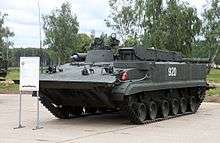
- BREM-L "Beglianka" (Ob.691) (bronirovannaya remontno-evakuatsionnaya mashina) – Armoured recovery vehicle with five-tonne crane and 20/40 metric tonne capacity winch.[40][41][42]

- 9P157-2 "Khrizantema-S" – Anti-tank version with Khrizantema (AT-15) system with radar and laser guidance. The 9P157-2 carries two 9M123 missiles on launch rails, which are extended from a stowed position; the radar is also stowed during transit. The missiles are re-loaded automatically from an internal magazine with 15 rounds (missiles are stored and transported in sealed canisters) and can also accept munitions manually loaded from outside the vehicle. The manufacturer claims that three 9P157-2 tank destroyers are able to engage 14 attacking tanks and destroy at least sixty percent of the attacking force. The dual guidance system ensures protection against electronic countermeasures and operation in all climatic conditions, day or night. NBC protection is provided for the crew (gunner and driver) of each 9P157-2 in addition to full armour protection equivalent to the standard BMP-3 chassis and entrenching equipment.[43] The 9M123 missile itself is supersonic, flying at an average speed of 400 m/s (Mach 1.2) and a range of between 400 and 6,000 meters.[44] Entered service in 2005.[45] More than 10 sets of new anti-tank guided missile (ATGM) complexes "Khrizantema-S" on the crawler, which replaced the complexes "Shturm", entered the artillery units of the Southern Military District, based in Ingushetia, in November 2012.[46] Khrizantema vehicles are fielded with artillery units.[47]
- 9P163M-1 "Kornet-T" – Anti-tank version with Kornet (AT-14) missile system. Some sources call it the 9P162. The Kornet is similar in function to the Khrizantema missile system. The 9P163M-1 carries two 9M133 missiles on launch rails, which are extended from a stowed position during transit. Missiles are re-loaded automatically by the tank destroyer from an internal magazine with 16 rounds (missiles are stored and transported in sealed canisters).[48] Nuclear, biological and chemical protection is provided for the two crew members (gunner and driver) in addition to full armour protection equivalent to the standard BMP-3 chassis. The guidance system of the 9P163M-1 allows two missiles to be fired at once, the missiles operating on different guidance (laser) channels. The first Kornet-T missile carriers were delivered in 2003 to replace the Shturm-S, and the first batch of 20 vehicles entered service in 2012. The Kornet-T is used by motorized units.[49]
- 2S18 "Pat-S" (Ob.697) – Self-propelled version of the 152 mm howitzer 2A61 "Pat-B". This was only a prototype, further development led to the 2S31.[50]
- 2S31 "Vena" – Fire support vehicle with a 120 mm mortar. Entered service in 2010.[51]
- DZM "Vostorg-2" (dorozhno-zemlerojnaya mashina) – Combat engineer vehicle with a dozerblade and excavating bucket. Prototype.
- UR-07 (ustanovka razminirovaniya) – Mine clearing system. The UR-07 might replace the UR-77 "Meteorit". It has the same chassis as the BMP-3 but a bigger steel hull with two launch ramps in the rear. The ramps are used to fire rockets towing hose-type mine-clearing line charges to clear mine fields.[52]
- UNSh (Ob.699) (unifitsirovannyj shassi) – Basic chassis for specialised variants.[53]
- KhTM (khodovoj trenazhor) – Driver trainer.
- Hermes or TKB-841 – Air-defence vehicle with high-velocity missiles and radar system. Prototype.[54]
- UDAR – Unmanned ground vehicle based on the tracked chassis of the BMP-3 with the center hull raised to fit the Epoch Remote Control Turret.[55]
- 2S38 – Self-propelled air defense vehicle based on BMP-3 chassis fitted with a 57 mm cannon and passive reconnaissance and target tracking equipment. It is designed to shoot down unmanned aerial vehicles (UAVs), cruise missiles, air-to-surface missiles, tactical warplanes and helicopters. The optical and electronic target acquisition system can spot an aircraft at 6.4 km (4.0 mi) and using sectoral observation can detect aircraft over 12 km (7.5 mi) out. The cannon is fast enough to destroy targets traveling 500 m/s (1,100 mph; 1,800 km/h; Mach 1.5).[56]
The turret of the BMP-3 has been fitted to the Patria Armoured Modular Vehicle.[57][58][59]
Operators
Current operators
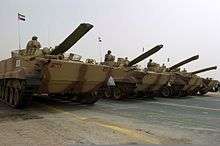





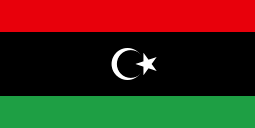




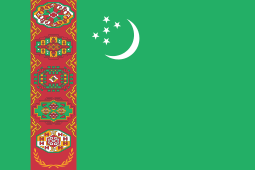



Potential operators


Failed bids


See also
References
- ↑ "BMD-3 with Berezhok weapon system – Russia | Thai Military and Asian Region".
- ↑ "BMP-3 IFV armored infantry fighting vehicle technical data | Russia Russian army light armoured vehicle UK | Russia Russian army military equipment vehicles UK".
- ↑ "Russian Bakhcha-U combat turret from KBP will increase firepower of IFV Infantry Fighting Vehicle TASS 10404171 | weapons defence industry military technology UK | analysis focus army defence military industry army".
- ↑ "Soderzhaniye" (PDF). Archived from the original (PDF) on 2006-11-03.
- 1 2 3 4 Zaloga, Steven J., Hull, Andrew W. and Markov, David R. (1999). Soviet/Russian Armor and Artillery Design Practices: 1945 to Present. Darlington Productions. ISBN 1-892848-01-5
- ↑ "Ob'yekt 688". Otvaga2004.narod.ru. Archived from the original on 2012-02-17. Retrieved 2011-11-12.
- ↑ "Products Of Our Plant". Rmz.ru. Archived from the original on 2012-03-31. Retrieved 2011-11-12.
- ↑ Russian Defense Ministry orders several hundred combat vehicles — manufacturer – Tass.ru, 12 May 2015
- ↑ "Rostec Signs Agreements Worth 40 billion Rubles at the ARMY 2017 Forum – India Strategic". www.indiastrategic.in.
- ↑ Kavanaugh, Shane Dixon. "Tiny UAE Tests Its Military Might In Yemen". Vocativ. Retrieved 12 August 2015.
- ↑ John Pike (2010-05-13). "BMP-3 Fighting Vehicle". Globalsecurity.org. Retrieved 2010-08-24.
- ↑ "Infantry Combat Vehicle BMP-3". Enemyforces.com. 1991-07-27. Retrieved 2010-02-07.
- ↑ "Peleng – Special optoelectronics". Peleng.by. Archived from the original on 2012-03-31. Retrieved 2011-11-12.
- ↑ "Archived copy" (PDF). Archived from the original (PDF) on 2012-03-31. Retrieved 2011-08-30.
- ↑ "Vesna-K Sighting system". Kurganmash.ru. Archived from the original on 2011-09-27. Retrieved 2011-11-12.
- ↑ "ИК-прицел «Содема» установят на БМП-3 - Еженедельник «Военно-промышленный курьер»". www.vpk-news.ru.
- ↑ Russian Company Tractors Plants presents BMP-3M armed with Ataka 9M120-1 anti-tank guided missiles - Armyrecognition.com, 25 August 2017
- ↑ New AU-220M combat module for Russian BMP-3 IFV. Army Recognition. 6 June 2018.
- ↑ http://pravda-team.ru/eng/image/photo/2/2/7/26227.jpeg
- ↑ "BMP-3 Infantry fighting vehicle". Archived from the original on 18 May 2015. Retrieved 1 February 2015.
- 1 2 "Боевая машина пехоты БМП-3. Описание. Технические характеристики. Применяемые агрегаты производства АО ММЗ Знамя". www.znamia.ru. Archived from the original on 2015-04-18. Retrieved 2015-05-18.
- ↑ ARG. "BMP-3 Infantry Fighting Vehicle". Military-Today.com. Retrieved 2010-08-24.
- ↑ "BMP-3 Infantry Fighting Vehicle (Russia)". Historyofwar.org. Retrieved 2010-08-24.
- ↑ "BMP-3 Infantry Combat Vehicle - Army Technology".
- ↑ "BMP-3M Infantry Fighting Vehicle (IFV) - Army Technology".
- ↑ "Kurganmashzavod. Fire power". www.kurganmash.ru.
- ↑ "BMP-3 Upgraded infantry fighting vehicle". Kurganmash.ru. Archived from the original on 2011-11-14. Retrieved 2011-11-12.
- ↑ "BMP-3M IFV Armoured Infantry Fighting Vehicle technical data sheet specifications pictures video 12803164 | Russia Russian army light armoured vehicle UK | Russia Russian army military equipment vehicles UK".
- ↑ "BMP-3K Command post vehicle". Kurganmash.ru. Archived from the original on 2012-03-31. Retrieved 2011-11-12.
- ↑ "BMP-3F Marines fighting vehicle". Kurganmash.ru. Archived from the original on 2011-11-26. Retrieved 2011-11-12.
- ↑ "BT-3F Amphibious Armored Personnel Carrier | Military-Today.com".
- ↑ "Armor: BMP-3 Forced To Improve Or Die".
- ↑ "BRM-3K Reconnaissance Vehicle | MilitaryLeak".
- ↑ "UralVagonZavod shows BMP-3 IFV with 57mm gun – Defence Blog".
- ↑ "Kurgan/Rubtsovsk BRM-3K Rys (Lynx) combat reconnaissance vehicle (Russian Federation)". Articles.janes.com. 2007-07-23. Archived from the original on May 3, 2012. Retrieved 2011-11-12.
- ↑ "RUBTSOVSK MACHINE BUILDING PLANT". rmz.ru. Archived from the original on 17 November 2015. Retrieved 26 November 2014.
- ↑ "PRODUCTS OF OUR PLANT". rmz.ru. Archived from the original on 31 March 2012. Retrieved 26 November 2014.
- ↑ Defense Ministry of Russia could invest more money to develop the new BMP-3 Dragoon Dragun IFV – Armyrecognition.com, 30 September 2015
- ↑ "MoD Finishes BMP-3 Dragun Trials". www.defense-aerospace.com.
- ↑ "BREM-L Armoured recovery vehicle". Kurganmash.ru. Archived from the original on 2011-10-15. Retrieved 2011-11-12.
- ↑ Servaes, Army Recognition Alain. "BREM-L description Pictures picture photo image Russian light armored armoured recovery vehicle Russian véhicule léger blindé de dépannage Russe". www.armyrecognition.com.
- ↑ Consulting, Don Busack. "BREM-L Walk Around Page 1". www.primeportal.net.
- ↑ "Khrizantema-S". Konstruktorskoye Byuro Mashynostroyenia. 2002–2008. Archived from the original on August 21, 2004. Retrieved 2008-11-06.
- ↑ Servaes, Army Recognition Alain. "BMP-3 Krizantema BMP3 Krizantema Picture pictures Photo Image light infantery anti-tank armoured armored fighting vehicle Army of Russia véhicule blindé léger antichar de combat d'infanterie Armée Russe". www.armyrecognition.com.
- ↑ "Archived copy". Archived from the original on 2014-03-09. Retrieved 2014-04-09.
- ↑ "Южный округ получил новые ПТРК – Еженедельник "Военно-промышленный курьер"". Retrieved 26 November 2014.
- ↑ Khrizantema (AT-15 Springer) – Military-Today.com
- ↑ "Kornet E Laser Guided Anti-Tank Missile". Defence Update. 2006-07-26. Archived from the original on 2008-07-05. Retrieved 2008-11-17.
- ↑ Kornet-T – Military-Today.com
- ↑ Сергей Суворов, Боевая машина пехоты БМП-3, стр. 16
- ↑ М. Барятинский. Советская бронетанковая техника 1945–1995 // Бронеколлекция. — 2000. — № 4. — С. 30
- ↑ "Archived copy". Archived from the original on 2013-11-10. Retrieved 2013-11-10.
- ↑ "BMP-3 Based multipurpose chassis". Kurganmash.ru. Archived from the original on 2011-09-27. Retrieved 2011-11-12.
- ↑ А.В. Карпенко, Современные самоходные зенитные установки, стр. 41
- ↑ Russia defense industry unveils the UDAR first unmanned BMP-3 infantry fighting vehicle – Armyrecognition.com, 6 October 2015
- ↑ Russia is developing new 2S38 anti-aircraft system on BMP-3 chassis - Armyrecognition.com, 31 January 2018
- ↑ "IDEX 2009 – More firepower on land and water". Janes.com. 2007-02-22. Retrieved 2010-08-24.
- ↑ "SOFEX 2010 – Galleries". Janes.com. Retrieved 2010-08-24.
- ↑ "Russia Develops Additional BMP-3 Variants". April 11, 2013.
- ↑ "-". Vedomosti.ru. Retrieved 26 November 2014.
- 1 2 3 4 Jane's Armour and Artillery 2003-2004
- ↑ Kementerian Pertahanan Ri. "Tank BMP-3F Resmi Perkuat TNI AL" (in Indonesian). Dephan.go.id. Retrieved 2011-11-12.
- ↑ JPNN. "37 Unit Tank Amfibi BMP-3F Lengkapi Koleksi Korps Marinir". Retrieved 26 November 2014.
- 1 2 Iraq and Saudi Arabia plan to acquire BMP-3 armoured infantry fighting vehicles from Russia – Armyrecognition.com, 30 September 2015
- ↑ https://defence-blog.com/army/iraq-receives-first-bmp-3-infantry-fighting-vehicles-russia.html
- ↑ Pike, John. "Kuwait - Army Equipment". www.globalsecurity.org.
- ↑ "ЦАМТО / Новости / Россия завершает выполнение последнего контракта на поставку Кувейту БМП-3". www.armstrade.org.
- ↑ "Russia completes BMP-3 infantry fighting vehicles delivery to Kuwait — manufacturer".
- ↑ "Россия завершила поставку БМП-3 в Кувейт - Еженедельник «Военно-промышленный курьер»". vpk-news.ru.
- ↑ Libya; Army incepts Russian tank destroyers Archived 2013-11-10 at the Wayback Machine. – Dmilt.com, 7 October 2013
- ↑ "Russians delivers armoured fighting vehicles".
- ↑ – http://fedpress.ru, 11 September 2015
- ↑ "BMP-3 | Russian Military Analysis". Warfare.ru. Retrieved 2011-11-12.
- ↑ "Russian Defense Ministry to get more than 200 new BMP-3 armored infantry vehicles".
- ↑ "Three-year contract for BMP-3 supplies fulfilled completely : Ministry of Defence of the Russian Federation". eng.mil.ru.
- ↑ https://www.armyrecognition.com/army-2018_news_russia_online_show_daily/army_2018_190_bmd-4m_airborne_ifvs_and_rakushka_btr-mdm_apcs_for_russian_airborne_troops.html
- ↑ "Sri Lanka (LTTE)". International Institute For Strategic Studies. March 15, 2007. Archived from the original on June 4, 2012. Retrieved March 15, 2007.
- 1 2 3 http://armstrade.sipri.org/armstrade
- ↑ "Archived copy". Archived from the original on 2016-10-18. Retrieved 2016-10-16.
- ↑ Jane's Sentinel: Turkmenistan (2011)
- ↑ Ground Forces Equipment – Ukraine inherited from the USSR. globalsecurity.org
- ↑ "ЦАМТО / Новости / Россия завершает программу модернизацию части парка БМП-3 армии ОАЭ". www.armstrade.org.
- ↑ Completed vehicle deliveries – Ruaviation.com, July 20, 2012
- ↑ "Venezuela; Army incepts new batch of BMP-3". dmilt.com. Archived from the original on 2 December 2013. Retrieved 26 November 2014.
- ↑ "Филиппины проявляют интерес к российской БМП-3Ф".
- ↑ "EU-Russia Watch 2012" (PDF). University of Tartu Press. April 2012. Archived from the original (PDF) on January 7, 2015. Retrieved 1 February 2015.
- ↑ "Russia offers to India to transfer technology of BMP-3 AIFV armoured infantry fighting vehicle". 21 December 2012. Retrieved 1 February 2015.
- ↑ "India Rejects BMP-3 Offer, Will Maintain FICV Program". Springfield, Virginia: Defense News. 10 December 2013. Retrieved 1 February 2015.
External links
| Wikimedia Commons has media related to BMP-3. |